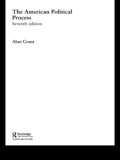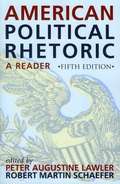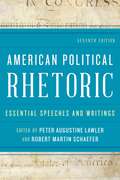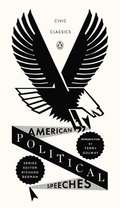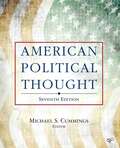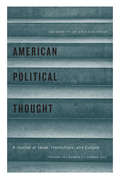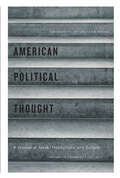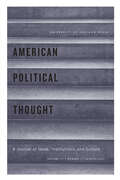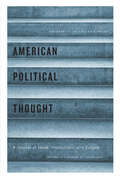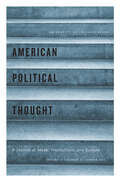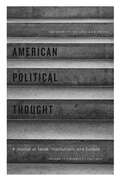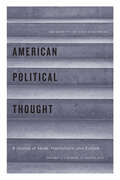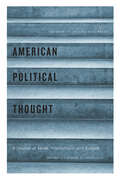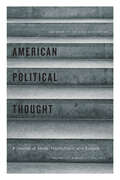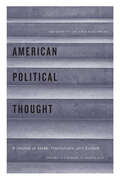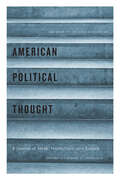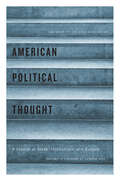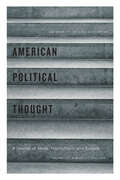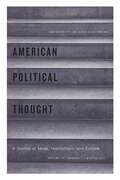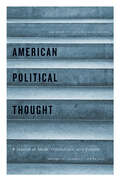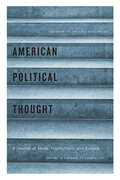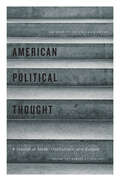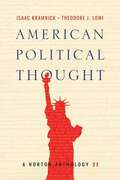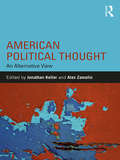- Table View
- List View
American Political Process
by Alan GrantAmerican Political Process examines both the formal institutions of government and organizations such as political parties and pressure groups. It analyzes how these bodies interact in the making of public policy in the United States in order to provide an understanding of contemporary American politics. The seventh edition has been thoroughly updated and revised with entirely new material on: the 2000 Presidential election and George W. Bush's presidency the September 11th attacks and the 'War on Terrorism' the 2002 mid-term elections controversial issues such as abortion and gun control. Each chapter includes a variety of useful tables and diagrams, suggestions for further reading and relevant websites and a glossary of key terms. Written with admirable clarity, this is the ideal textbook for students of American politics and society.
American Political Rhetoric: A Reader (5th edition)
by Peter Augustine Lawler Robert Martin SchaeferThis reader is designed for introductory classes in American politics and government that are focused on fundamental political principles. It includes classic examples of the nation's political rhetoric.
American Political Rhetoric: Essential Speeches And Writings
by Peter Augustine Lawler Robert Martin SchaeferAmerican Political Rhetoric is the only reader for introductory classes in American politics, government, and political communication designed to explore fundamental political principles through examples of political rhetoric ranging from the founding to today. Now in its seventh edition, its selections include the entire political spectrum and contributors range from our nation's founders to contemporary elected public officials, Supreme Court opinions, and representatives of historic movements for social change. The new edition is fully updated to include recent Supreme Court decisions, edited for use in the classroom, presidential speeches, and expanded chapters on presidential powers, race, and gender. The book is now more useful than ever for students and teachers thanks to a supplementary website available at americanpoliticalrhetoric. com.
American Political Speeches
by Richard Beeman Terry GolwayA selection of speeches by the most inspiring and persuasive orators in American history Penguin presents a series of six portable, accessible, and--above all--essential reads from American political history, selected by leading scholars. Series editor Richard Beeman, author of The Penguin Guide to the U.S. Constitution, draws together the great texts of American civic life to create a timely and informative mini-library of perennially vital issues. Whether readers are encountering these classic writings for the first time, or brushing up in anticipation of the 50th anniversary of the Civil Rights Act, these slim volumes will serve as a powerful and illuminating resource for scholars, students, and civic-minded citizens. American Political Speeches includes the best American rhetoric from inside and outside the White House. Some of the greatest words spoken in American history have come from men and women who lacked the biggest bully pulpit in the country, but who nevertheless were able to move the nation with words. Frederick Douglass explained the irony of Independence Day from the perspective of a slave. Martin Luther King, Jr. described his dream of an interracial America. William Jennings Bryan gave voice to social discontent with a single phrase, "a cross of gold." Barbara Jordan summoned the nation"s outrage during the impeachment hearings against Richard Nixon. And the best presidents, not by coincidence, have tended to be those with an appreciation for the use of language: Lincoln explaining a new birth of freedom at Gettysburg; John Kennedy voicing moral outrage at the Berlin Wall; Franklin D. Roosevelt chatting to a nation gathered in front of radios; Ronald Reagan addressing Congress freshly healed from an assassination attempt.
American Political Thought
by Michael S. CummingsPresident Obama′s hope of bringing a new kind of politics to Washington has fallen on hard times, with hardening party lines reflecting ideological polarization. Utilizing the organizing theme of partisan gridlock in the seventh edition′s introductory materials and author headnotes, editor Michael Cummings reminds readers that partisanship has long been a recurring problem for Americans, dating back to the deadly conflicts among the Iroquois nations, to the debates of the constitutional convention, and to the near destruction of the young republic during the Civil War. American Political Thought challenges students to examine their own political thinking in light of insights from past thinkers and in terms of the challenges they face as citizens of the twenty-first century. Along with time-tested readings, about one-third of this edition′s authors are new, including a number of thinkers from earlier periods, as well as more recent selections from liberal, conservative, and more unconventional thinkers.
American Political Thought, volume 10 number 3 (Summer 2021)
by American Political ThoughtThis is volume 10 issue 3 of American Political Thought. Bridging the gap between historical, empirical, and theoretical research, American Political Thought (APT) is the only journal dedicated exclusively to the study of the American political tradition. Interdisciplinary in scope, APT features research by political scientists, historians, literary scholars, economists, and philosophers who study the foundation and political tradition of concepts such as democracy, constitutionalism, equality, liberty, citizenship, political identity, and the role of the state.
American Political Thought, volume 10 number 4 (Fall 2021)
by American Political ThoughtThis is volume 10 issue 4 of American Political Thought. Bridging the gap between historical, empirical, and theoretical research, American Political Thought (APT) is the only journal dedicated exclusively to the study of the American political tradition. Interdisciplinary in scope, APT features research by political scientists, historians, literary scholars, economists, and philosophers who study the foundation and political tradition of concepts such as democracy, constitutionalism, equality, liberty, citizenship, political identity, and the role of the state.
American Political Thought, volume 11 number 1 (Winter 2022)
by American Political ThoughtThis is volume 11 issue 1 of American Political Thought. Bridging the gap between historical, empirical, and theoretical research, American Political Thought (APT) is the only journal dedicated exclusively to the study of the American political tradition. Interdisciplinary in scope, APT features research by political scientists, historians, literary scholars, economists, and philosophers who study the foundation and political tradition of concepts such as democracy, constitutionalism, equality, liberty, citizenship, political identity, and the role of the state.
American Political Thought, volume 11 number 2 (Spring 2022)
by American Political ThoughtThis is volume 11 issue 2 of American Political Thought. Bridging the gap between historical, empirical, and theoretical research, American Political Thought (APT) is the only journal dedicated exclusively to the study of the American political tradition. Interdisciplinary in scope, APT features research by political scientists, historians, literary scholars, economists, and philosophers who study the foundation and political tradition of concepts such as democracy, constitutionalism, equality, liberty, citizenship, political identity, and the role of the state.
American Political Thought, volume 11 number 3 (Summer 2022)
by American Political ThoughtThis is volume 11 issue 3 of American Political Thought. Bridging the gap between historical, empirical, and theoretical research, American Political Thought (APT) is the only journal dedicated exclusively to the study of the American political tradition. Interdisciplinary in scope, APT features research by political scientists, historians, literary scholars, economists, and philosophers who study the foundation and political tradition of concepts such as democracy, constitutionalism, equality, liberty, citizenship, political identity, and the role of the state.
American Political Thought, volume 11 number 4 (Fall 2022)
by American Political ThoughtThis is volume 11 issue 4 of American Political Thought. Bridging the gap between historical, empirical, and theoretical research, American Political Thought (APT) is the only journal dedicated exclusively to the study of the American political tradition. Interdisciplinary in scope, APT features research by political scientists, historians, literary scholars, economists, and philosophers who study the foundation and political tradition of concepts such as democracy, constitutionalism, equality, liberty, citizenship, political identity, and the role of the state.
American Political Thought, volume 12 number 1 (Winter 2023)
by American Political ThoughtThis is volume 12 issue 1 of American Political Thought. Bridging the gap between historical, empirical, and theoretical research, American Political Thought (APT) is the only journal dedicated exclusively to the study of the American political tradition. Interdisciplinary in scope, APT features research by political scientists, historians, literary scholars, economists, and philosophers who study the foundation and political tradition of concepts such as democracy, constitutionalism, equality, liberty, citizenship, political identity, and the role of the state.
American Political Thought, volume 12 number 2 (Spring 2023)
by American Political ThoughtThis is volume 12 issue 2 of American Political Thought. Bridging the gap between historical, empirical, and theoretical research, American Political Thought (APT) is the only journal dedicated exclusively to the study of the American political tradition. Interdisciplinary in scope, APT features research by political scientists, historians, literary scholars, economists, and philosophers who study the foundation and political tradition of concepts such as democracy, constitutionalism, equality, liberty, citizenship, political identity, and the role of the state.
American Political Thought, volume 12 number 3 (Summer 2023)
by American Political ThoughtThis is volume 12 issue 3 of American Political Thought. Bridging the gap between historical, empirical, and theoretical research, American Political Thought (APT) is the only journal dedicated exclusively to the study of the American political tradition. Interdisciplinary in scope, APT features research by political scientists, historians, literary scholars, economists, and philosophers who study the foundation and political tradition of concepts such as democracy, constitutionalism, equality, liberty, citizenship, political identity, and the role of the state.
American Political Thought, volume 12 number 4 (Fall 2023)
by American Political ThoughtThis is volume 12 issue 4 of American Political Thought. Bridging the gap between historical, empirical, and theoretical research, American Political Thought (APT) is the only journal dedicated exclusively to the study of the American political tradition. Interdisciplinary in scope, APT features research by political scientists, historians, literary scholars, economists, and philosophers who study the foundation and political tradition of concepts such as democracy, constitutionalism, equality, liberty, citizenship, political identity, and the role of the state.
American Political Thought, volume 13 number 1 (Winter 2024)
by American Political ThoughtThis is volume 13 issue 1 of American Political Thought. Bridging the gap between historical, empirical, and theoretical research, American Political Thought (APT) is the only journal dedicated exclusively to the study of the American political tradition. Interdisciplinary in scope, APT features research by political scientists, historians, literary scholars, economists, and philosophers who study the foundation and political tradition of concepts such as democracy, constitutionalism, equality, liberty, citizenship, political identity, and the role of the state.
American Political Thought, volume 13 number 2 (Spring 2024)
by American Political ThoughtThis is volume 13 issue 2 of American Political Thought. Bridging the gap between historical, empirical, and theoretical research, American Political Thought (APT) is the only journal dedicated exclusively to the study of the American political tradition. Interdisciplinary in scope, APT features research by political scientists, historians, literary scholars, economists, and philosophers who study the foundation and political tradition of concepts such as democracy, constitutionalism, equality, liberty, citizenship, political identity, and the role of the state.
American Political Thought, volume 13 number 3 (Summer 2024)
by American Political ThoughtThis is volume 13 issue 3 of American Political Thought. Bridging the gap between historical, empirical, and theoretical research, American Political Thought (APT) is the only journal dedicated exclusively to the study of the American political tradition. Interdisciplinary in scope, APT features research by political scientists, historians, literary scholars, economists, and philosophers who study the foundation and political tradition of concepts such as democracy, constitutionalism, equality, liberty, citizenship, political identity, and the role of the state.
American Political Thought, volume 13 number 4 (Fall 2024)
by American Political ThoughtThis is volume 13 issue 4 of American Political Thought. Bridging the gap between historical, empirical, and theoretical research, American Political Thought (APT) is the only journal dedicated exclusively to the study of the American political tradition. Interdisciplinary in scope, APT features research by political scientists, historians, literary scholars, economists, and philosophers who study the foundation and political tradition of concepts such as democracy, constitutionalism, equality, liberty, citizenship, political identity, and the role of the state.
American Political Thought, volume 14 number 1 (Winter 2025)
by American Political ThoughtThis is volume 14 issue 1 of American Political Thought. Bridging the gap between historical, empirical, and theoretical research, American Political Thought (APT) is the only journal dedicated exclusively to the study of the American political tradition. Interdisciplinary in scope, APT features research by political scientists, historians, literary scholars, economists, and philosophers who study the foundation and political tradition of concepts such as democracy, constitutionalism, equality, liberty, citizenship, political identity, and the role of the state.
American Political Thought, volume 14 number 2 (Spring 2025)
by American Political ThoughtThis is volume 14 issue 2 of American Political Thought. Bridging the gap between historical, empirical, and theoretical research, American Political Thought (APT) is the only journal dedicated exclusively to the study of the American political tradition. Interdisciplinary in scope, APT features research by political scientists, historians, literary scholars, economists, and philosophers who study the foundation and political tradition of concepts such as democracy, constitutionalism, equality, liberty, citizenship, political identity, and the role of the state.
American Political Thought, volume 14 number 3 (Summer 2025)
by American Political ThoughtThis is volume 14 issue 3 of American Political Thought. Bridging the gap between historical, empirical, and theoretical research, American Political Thought (APT) is the only journal dedicated exclusively to the study of the American political tradition. Interdisciplinary in scope, APT features research by political scientists, historians, literary scholars, economists, and philosophers who study the foundation and political tradition of concepts such as democracy, constitutionalism, equality, liberty, citizenship, political identity, and the role of the state.
American Political Thought, volume 14 number 4 (Fall 2025)
by American Political ThoughtThis is volume 14 issue 4 of American Political Thought. Bridging the gap between historical, empirical, and theoretical research, American Political Thought (APT) is the only journal dedicated exclusively to the study of the American political tradition. Interdisciplinary in scope, APT features research by political scientists, historians, literary scholars, economists, and philosophers who study the foundation and political tradition of concepts such as democracy, constitutionalism, equality, liberty, citizenship, political identity, and the role of the state.
American Political Thought: A Norton Anthology
by Isaac Kramnick Theodore J. LowiThe leading anthology, now more relevant than ever Revised and updated based on instructor feedback, this Second Edition presents key works from the colonial period to the present era. New selections―including readings from the Obama and Trump eras―help students understand how political thought in the 21st century builds on and sometimes departs from earlier traditions.
American Political Thought: An Alternative View
by Alex Zamalin Jonathan KellerThe twenty-first century presents unique political challenges, like increasing concern over racially based police brutality and mass incarceration, continuing economic and gender inequality, the rise of conservative and libertarian politics, and the appropriate role of religion in American politics. Current scholarship in American political thought research neither adequately responds to the contemporary moment in American politics nor fully captures the depth and scope of this rich tradition. This collection of essays offers an innovative expansion of the American political tradition. By exposing the major ideas and thinkers of the four major yet still underappreciated alternative traditions of American political thought—African American, feminist, radical and conservative—this book challenges the boundaries of American political thinking about such values like freedom, justice, equality, democracy, economy, rights, identity, and the role of the state in American life. These traditions, the various authors show in different ways, not only present a much fuller and more accurate characterization of what counts as American political thought. They are also especially unique for the conceptual resources they provide for addressing contemporary developments in American politics. Offering an original and substantive interpretation of thinkers and movements, American Political Thought will help students understand how to put American political thought into conversation with contemporary debates in political theory.
